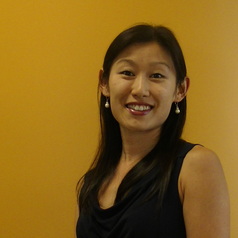
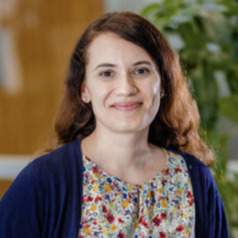
Meltem Weger
Postdoctoral Research Fellow, Institute for Molecular Bioscience, The University of Queensland
Meltem Weger is Postdoctoral Research Fellow in the laboratory of A/Prof. Frederic Gachon at the Institute for Molecular Bioscience (IMB) at the University of Queensland. Meltem is interested in the understanding of the role of the stress axis and the circadian clock for (patho-) physiology and metabolism.
Less ![]()
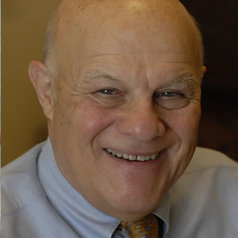
Melvyn Levitsky
Professor of International Policy and Practice, University of Michigan
Ambassador Melvyn Levitsky, a retired Career Minister in the U.S. Foreign Service, is Professor of International Policy and Practice at the University of Michigan's Gerald R. Ford School of Public Policy. He is Senior Fellow of the School's International Policy Center and a member of the University of Michigan's Substance Abuse Research Center (UMSARC) and a Faculty Associate of the University's Center for Russian and East European Studies (CREES) and of the Weiser Center for Emerging Democracies.
Prior to joining the University of Michigan in the fall of 2006, Ambassador Levitsky taught for eight years as Professor of Practice in Public Administration and International Relations at Syracuse University's Maxwell School of Citizenship and Public Affairs. He is a Distinguished Fellow of the Maxwell School's Moynihan Institute of Global Affairs. He has also taught as a Professorial Lecturer at the Johns Hopkins University School of Advanced International Studies (SAIS).
In 2003 Ambassador Levitsky was elected by a vote of the United Nations Economic and Social Council to a seat on the International Narcotics Control Board (INCB), an independent body of experts headquartered in Vienna and responsible for monitoring and promoting standards of drug control established by international treaties. He served on the INCB until 2012.
During his 35-year career as a U.S. diplomat, Ambassador Levitsky was Ambassador to Brazil from 1994-98 and before that held such senior positions as Assistant Secretary of State for International Narcotics Matters, Executive Secretary of the State Department, Ambassador to Bulgaria, Deputy Director of the Voice of America, and Deputy Assistant Secretary of State for Human Rights.
Ambassador Levitsky also served as Director of the State Department's Office of UN Political Affairs and as Officer-in-Charge of U.S.-Soviet Bilateral Relations. Earlier in his career he was political officer at the U.S. Embassy in Moscow and a Consul at U.S. Consulates in Belem, Brazil and Frankfurt, Germany.
He has a Bachelor of Arts degree from the University of Michigan and a Master of Arts degree in Political Science from the University of Iowa.
Less ![]()

Melvyn F Ternan
Senior lecturer in animation and digital media production, Sheffield Hallam University
My taught subjects include stop motion animation, animation project development and production and experimental stop motion. In 2013 my first book, Stop Motion Animation, was published by Barrons educational books and translated into six different languages for sale around the world. My research areas include production temporality, animation technique, idea genesis and animation method identification.
I previously worked as a studio animator and compositor for many years, co-founding two animation studios in Bristol before working as a freelance animator and project facilitator. During my time as a freelancer, I worked on over 150 projects covering animation, live action, online production and media distribution. I also work as a voice artist on short, award winning animations.
Since working at Sheffield Hallam University, I have realised a hidden passion for teaching animation, for helping others grow their understanding and development of this creative art form. I am honoured to have been one of the recipients of the Sheffield Hallam University Inspirational Teaching award in 2017 as well as being recipient of the college level award in 2012, 2018 and 2021.
Specialist areas of interest
Pre-Production for Animation
Stop Motion Animation
Visual Techniques within Animation
Post-Production for Animation and Animation Project Management
Melvyn also enjoys studying idea genesis, technique identification and enjoying the freedom of his motorbike.
Less ![]()
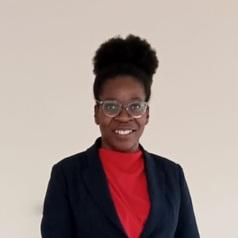
Mendita A. Ugembe
PhD in the Sustainable Energy Systems project in the Department of Geographic Engineering, Geophysics, and Energy, Science Faculty, Universidade de Lisboa
Less ![]()
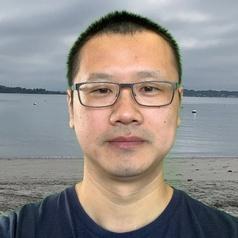
Meng (Matt) Wei
Associate Professor of Oceanography, University of Rhode Island
Meng (Matt) Wei is an associate professor of oceanography at the University of Rhode Island’s Graduate School of Oceanography. His lab work on topics include geodesy, fault mechanics and natural hazards. Wei completed his Ph.D. in earth sciences at the Scripps Institute of Oceanography.
Less ![]()
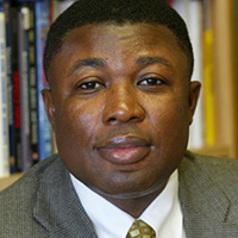
Mensah Adinkrah
Professor, Sociology and Criminal Justice, Central Michigan University
Mensah Adinkrah is a Professor of Sociology and Criminal Justice at Central Michigan University. His current research interests focus on homicide, suicide, masculinities, death studies, and witchcraft. His newest book, Witchcraft, Witches and Violence in Ghana (August 2015), was published by Berghahn Books.
Professor Adinkrah holds academic degrees in sociology from the University of Ghana, Legon, Queen's University, Kingston, Ontario, Canada and Washington University in St. Louis, Missouri, USA. He was a senior Fulbright research scholar to Ghana during 2003-2004.
Born and raised in Ghana, West Africa, Dr. Adinkrah speaks and reads Twi (Akan).
Less ![]()

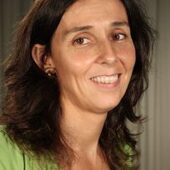

Meredith Gore
Professor, University of Maryland
I am a human geographer.
I advance understanding about the human dimensions of global environmental change such as biodiversity loss and climate change. The majority of my research uses risk concepts to explore human-environment interactions and all of my efforts are designed to build evidence for action. I bring an interdisciplinary perspective to a range of conservation issues such as wildlife trafficking, illegal fishing and illegal logging.
I am on the faculty of the Department of Geographical Sciences at the University of Maryland, College Park. I received my PhD in Natural Resource Policy and Management from Cornell University, MA in Environment and Resource Policy from George Washington University, and BA in Anthropology and Environmental Studies from Brandeis University. From 2006-2020, I was on the faculty at Michigan State University.
I am an American Geographical Society Council Member, a National Academies of Sciences Jefferson Science Fellow, US Department of State Embassy Science Fellow and Emerging Wildlife Conservation Leader.
Less ![]()
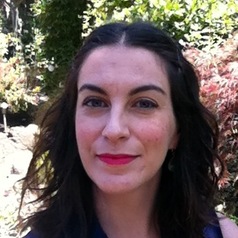
Meredith J C Warren
Lecturer in Biblical and Religious Studies, University of Sheffield
Meredith Warren is Lecturer in Biblical and Religious Studies at the University of Sheffield, and is a member of SIIBS, the Sheffield Institute for Interdisciplinary Biblical Studies. She directs the SIIBS research theme, Embodied Religion.
Warren completed her degrees (BA, MA, PhD) at McGill University and from 2013–2015 held a postdoctoral position at the University of Ottawa funded by the Fonds de Recherche du Québec — Société et Culture. She has taught classes on women in early Judaism and Christianity, Koine Greek, ancient Mediterranean religions, and the early church. Meredith’s primary research interests lie in the cultural and theological interactions among the religions of ancient Mediterranean, especially early Judaism and Christianity. In particular, Meredith is interested in how shared cultural understandings of food and eating play a role in ancient narratives, including the Pseudepigrapha, Hellenistic romance novels, and the Gospels.
Meredith’s doctoral work, recently published as My Flesh is Meat Indeed: A Nonsacramental Reading of John 6:51–58 (Fortress 2015), investigates how the Gospel of John makes use of Jewish, Christian, Greek, and Roman attitudes about sacrifice, divinity, and the consumption of human flesh in order to make claims about Jesus’ divinity.
Her current book project, titled Hierophagy: Transformational Eating in Ancient Literature, examines how characters in literature are transformed by eating otherworldly food. An article emerging from this research, “My Heart Poured Forth Understanding: 4 Ezra’s Fiery Cup as Hierophagic Consumption,” was recently published at the journal Studies in Religion.
Less ![]()
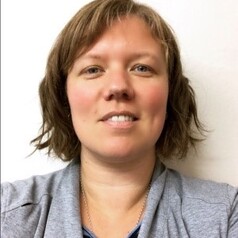
Meredith Peddie
Senior Lecturer, Department of Human Nutrition, University of Otago
Meredith Peddie has a BPhEd (Hons) in Sports Science, a BSc and MSc in Nutrition, and graduated with her PhD from the University of Otago in 2012. Between 2012 and 2020 Meredith worked in the Department in research positions funded by the National Heart Foundation of New Zealand. She joined the Department permanently as a Senior Lecturer in February 2020. Meredith's main area of research focuses on the postprandial metabolic effects of interrupting sitting time with short bouts of physical activity, but she is also interested in how moving more and sitting less impacts health in a broader sense. Meredith's other research interests include the impact of nutrition, sedentary behaviour and physical activity on cardiometabolic risk.
Less ![]()
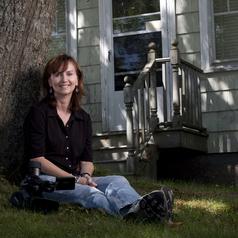
Meredith Ralston
Professor of Women's Studies and Political Studies, Mount Saint Vincent University
My research work has been mainly in the areas of women and politics, slut-shaming and sex work in Canada and the Philippines.
In my new book, Slut-Shaming, Whorephobia, and the Unfinished Sexual Revolution published by McGill-Queen's University Press in June, I examine the common denominators between the #MeToo movement, the myths of rape culture, and the pleasure gap between men and women to reveal the ways that sexually liberated women threaten the traditional patriarchy. Weaving in history, pop culture, philosophy, interviews with sex workers, and anecdotes, I show how women will achieve sexual equality only when the sexual double standard and good girl/bad girl binary are eliminated and women viewed by society as “whores” are destigmatized. Illustrating how women’s sexuality is policed by both men and women, I argue that women must be allowed the same personal autonomy as men: the freedom to make sexual decisions for themselves, to obtain orgasm equality, and to insist on their own sexual pleasure. Dispelling the myth that all sex workers are victims and all clients are violent, the book calls out Western society’s hypocrisy about sex and shows how stigma and the marginalization of sex workers harms all women.
Less ![]()
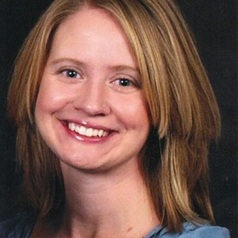
Meredith Richards
Associate Professor of Education Policy, Southern Methodist University
Meredith P. Richards is an associate professor of Education Policy at Southern Methodist University. Her research focuses on exploring the effects of educational policies on equity and stratification in schools and situating policies in their metropolitan and geographic contexts.
Less ![]()
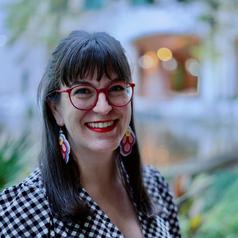
Meredith Warren
Senior Lecturer in Biblical and Religious Studies, University of Sheffield
I am a Senior Lecturer at the University of Sheffield, where I am the Director of the Sheffield Centre for Interdisciplinary Biblical Studies. In addition, I am editor in chief of the open-access Journal for Interdisciplinary Biblical Studies.
I have published numerous books and articles on early Christianity, early Judaism, and biblical texts. Most recently, I published a co-authored text book with Sara Parks and Shayna Sheinfeld titled Jewish and Christian Women in the Ancient Mediterranean (Routledge 2022). I have two previous mongraphs. Food and Transformation in Ancient Mediterranean Literature (SBL, 2019) defines a genre of transformative ingestion called hierophagy. I use sensory analysis to explore how performative consumption brings about access to other worlds in ancient Mediterranean narratives. My first book, My Flesh is Meat Indeed (Fortress; 2015), evaluates how John 6:51c–58 contributes to the gospel’s presentation of Jesus as divine in light of Hellenistic attitudes about sacrifice, divinity, and the consumption of human flesh. Soon to be published are two co-edited volumes on Judeophobia and the New Testament (Eerdmans 2025) and on Good Omens and the Bible (Sheffield Phoenix 2025).
Less ![]()
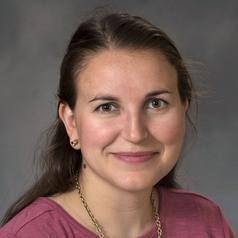
Meredith K. Ginley
Assistant Professor of Psychology, East Tennessee State University
Dr. Meredith Ginley is an Assistant Professor in the Department of Psychology at East Tennessee State University and a Licensed Clinical Psychologist. She completed her undergraduate degree at Tufts University, her Ph.D. at The University of Memphis, and her clinical internship at the University of Mississippi Medical Center. She also completed a postdoctoral fellowship in addiction at the University of Connecticut School of Medicine.
Her research focuses on efforts to improve outcomes and retention in treatment for substance use disorders and behavioral addictions. Specifically, she is interested in how targeting individual differences can improve treatment uptake and retention and how providing adjunctive interventions such as motivational interviewing and contingency management can improve overall treatment outcomes. She has over 20 publications specifically related to gambling and has been engaged in the treatment of individuals with gambling disorder as either a clinician or a clinical supervisor since 2011.
Dr. Ginley is a co-investigator at The Institute for Gambling Education and Research and Director of The Gambling Clinic East. She is currently a co-investigator on a grant from the Tennessee Department of Mental Health and Substance Abuse Services to facilitate expanded access to gambling prevention and treatment services for all Tennesseans.
Less ![]()
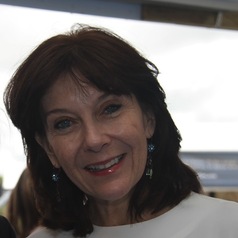
Mererid Hopwood
Professor of Welsh and Celtic Studies, Aberystwyth University
Mererid Hopwood is Professor of Welsh and Celtic Studies, Aberystwyth University. Before that she had been Professor of Languages and the Curriculum Cymreig in the University of Wales Trinity Saint David.
She has spent her career in the fields of languages, literature, education and the arts. She won the National Eisteddfod of Wales’ Chair, Crown and Prose Medal and Welsh Book of the Year prize for poetry in 2016 for her collection of poems, Nes Draw. She has been children’s poet laureate of Wales (Bardd Plant Cymru) and in 2018 won the Tir na n’Og prize for her writing for children. She was awarded the Hay Festival Poetry Medal in 2023.
Mererid has composed words for musicians, visual artists and dancers, and has taken part in literature festivals in Europe, Asia and South America. She has translated many works of literature into Welsh including plays from Spanish and German for Theatr Genedlaethol Cymru.
She is Fellow of the Learned Society of Wales, University of Wales Trinity Saint David and the Academi Gymreig, and Honorary President of the Waldo Williams Society. She is Secretary of the Academi Heddwch Cymru (Wales' peace institute).
Less ![]()

Merewalesi Yee
PhD Candidate, School of Earth and Environment Sciences, The University of Queensland
I am a Fijian woman pursuing a PhD at The University of Queensland, in Brisbane, Australia. My project seeks to advance understanding of opportunities and challenges for transformative mobilities where mobility contributes to climate change adaptation and positive development outcomes across multiple scales, places of origin, destination and transition. My research site is Fiji. Standing on the shoulders of three Giants that form my advisory team A/Prof Karen McNamara (UQ), A/Prof Celia McMichael (Unimelb) and Dr Annah Piggott-McKellar (QUT). Prior to my PhD journey, I have worked at USP as a regional teaching assistant/facilitator for students around the Pacific. During my PhD , I have been privileged to be part of several projects funded by the Australian Research Council as a research assistant and project officer using Talanoa research method to investigate climate change and adaptation, voluntary immobility, planned relocation, place-belongingness and gender food security and disaster resilience in the context of climate-related risks. I have conducted fieldwork in 8 communities in Fiji from 2021 to 2022. I am also a fellow with Australia Climate for Change organisation whose main aim is to help everyday Australians to have a better conversation about climate change and to take action.
Less ![]()
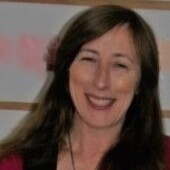

Meridith Sones
PhD Candidate and Knowledge Mobilization Manager, Faculty of Health Sciences, Simon Fraser University
I'm part of the Cities, Health, and Active Transportation Research (CHATR) Lab at Simon Fraser University and the Knowledge Mobilization Manager for the Interventions, Research, and Action in Cities Team (www.teaminteract.ca). My research explores how community design shapes social connectedness, health, and equity in cities.
Less ![]()
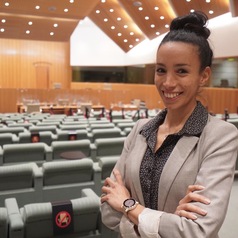
Meriem Naili
PhD candidate, College of Social Sciences and International Studies, University of Exeter
Meriem, a PhD candidate at the College of Social Sciences and International Studies, has spent recent months conducting interviews as part of her research on the conflict in Western Sahara. The interviews took place in London and New York where she gained valuable insights from, among others, Aminatou Haidar, one of Africa’s most prominent human rights activist and Nobel Prize nominee.
Meriem’s research focuses on the absence of an explicit human rights monitoring mechanisms in the United Nations Mission for the Referendum in Western Sahara (MINURSO). In April 2019, the United Nations Security Council unanimously extended the mandate of MINURSO for the 45th time since its creation in 1991, but once again did so without entrusting the Mission with any human rights monitoring responsibilities. This makes MINURSO the only post-Cold War UN peacekeeping mission without a human rights monitoring mandate. This is despite the fact that, according to reports from major international NGOs, human rights abuses have been committed by both parties to the long-running conflict in Western Sahara.
Against this background, Meriem is evaluating the extent to which human rights monitoring and protection mechanisms can play a part in advancing the current process towards a peaceful resolution of the conflict in the Western Sahara. She has a particular interest in the issue regarding the right to access natural resources and their management by a people living in a Non-Self-Governing Territory. To that effect, she has been invited to join a panel at the next World Congress of the International Political Science Association due to take place in Lisbon next summer under the title: “Why do natural resources matter in the Western Sahara conflict: Actors and Strategies”.
In addition to working on her thesis, Meriem has participated in a number of high-profile conferences and meetings on the subject of the Western Sahara throughout Europe. She is a member of the steering committee of the International Academic Observatory on Western Sahara at the University of Paris Descartes. As such, she has participated in a pluri-disciplinary colloquium in Amiens earlier this year on the legal, economical, anthropological and social questions raised by the situation in Western Sahara.
Meriem has recently been offered a placement at the European Parliament in Brussels where she will be working closely with the Human Rights Advisor to the Greens/EFA group, looking specifically at the relations between the EU and Western Sahara.
Less ![]()
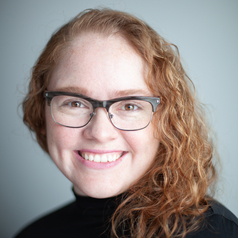
Merissa Daborn
Assistant Professor in Indigenous Studies, University of Manitoba
Dr. Merissa Daborn is a white scholar and an Assistant Professor in the Department of Indigenous Studies at the University of Manitoba where she researches at the intersections of food, technoscience, surveillance, policing, policy, and whiteness.
Her latest research is focussed on the relationship between citizen surveillance, policing, and grocery stores as carceral spaces in Winnipeg.
Merissa is a member of the Indigenous STS Lab in the Faculty of Native Studies at the University of Alberta. She is dedicated to research in the areas of urban Indigenous studies and Indigenous STS (science, technology, and society).
Less ![]()

Merissa Elizabeth Hickman
Postgraduate Researcher in Preconception Health and Genetics., University of Leicester
Merissa Elizabeth Hickman is a current PhD student at The University of Leicester. She is a Wellcome Trust Genetic Epidemiology Doctoral Training Programme Candidate. Her research focuses on Responsibilisation Practices in the Preconception Period. She is taking on the role of Secretary for the UK Preconception EMCR Network as of January 2024.
Less ![]()

Merja Myllylahti
Project manager and author for Journalism, Media and Democracy (JMAD) Research Center, Auckland University of Technology
Merja Myllylahti is a researcher at Auckland University of Technology in New Zealand. Her research interests lie in digital media economy , online news business models and media ownership. She is also a project manager and author at the AUT Center of Journalism, Media and Democracy (JMAD). She is experienced financial journalist and TV reporter having worked 15 years in London for newspapers, TV and online media.
Less ![]()
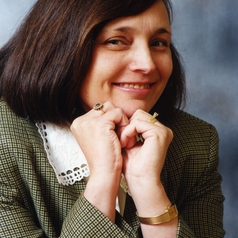
Merle A. Williams
Professor Emerita of English and Research Associate of the African Centre for the Study of the United States, University of the Witwatersrand
Merle A. Williams is Professor Emerita of English in the School of Literature, Language and Media at the University of the Witwatersrand in Johannesburg and a Research Associate of the African Centre for the Study of the United States (ACSUS). Her main interests lie in the relations between literature and philosophy, trauma theory and Holocaust writing, as well as Romantic poetry and fiction from the nineteenth century to the present.
Merle has published widely on the canonical author Henry James, including 'Henry James and the Philosophical Novel: Being and Seeing' (Cambridge University Press, reprinted in 2009). She is currently completing a critical text of 'The Awkward Age' for 'The Cambridge Edition of the Complete Fiction of Henry James'. She has also edited literary-theoretical collections entitled 'Hospitalities: Transitions and Transgressions, North and South' (Routledge 2020) and 'Cultures of Populism: Institutions, Practices and Resistance' (Routledge, 2022). A co-edited volume on the interplay between literature and identity is in progress.
Merle has held visiting research positions in Germany, Sweden and the United States. Through ACSUS she is involved in a range of international academic collaborations, notably teaching a course on 'Cultures of Hate and Oppression: Antisemitism, the Holocaust, Colonialism and Gender' for the Open Society University Network (OSUN).
Less ![]()
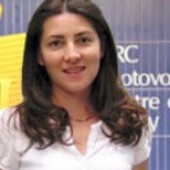
Merlinde Kay
Associate professor, School of Photovoltaic and Renewable Energy Engineering, UNSW Sydney
Less ![]()
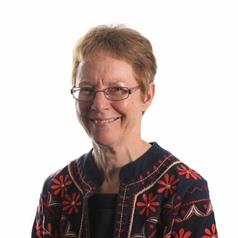
Merrilyn Goos
Adjunct Professor of Education, University of the Sunshine Coast
I am a mathematics educator and mathematics education researcher with doctoral and Master's degrees in this field. I was formerly a secondary school mathematics teacher, following a first career in industry as a food technologist.
Less ![]()

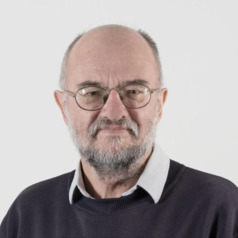
Mervyn Jackson
Associate Professor, STEM|Health and Biomedical Sciences, RMIT University
PhD brought together three inter-related areas: Psychology, Tourism, and, Criminal Victimisation
Less ![]()
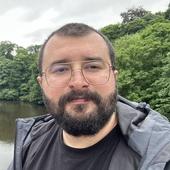
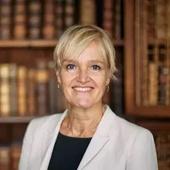
Mette Morsing
Director of the Smith School of Enterprise and the Environment, University of Oxford
Less ![]()
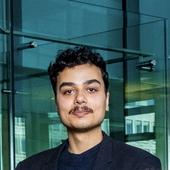
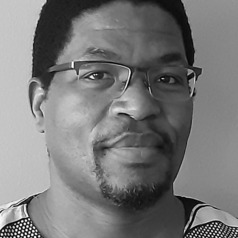
Mfaniseni Fana Sihlongonyane
Professor of Development Planning and Urban Studies, University of the Witwatersrand
Mfaniseni Fana Sihlongonyane was appointed lecturer in the Planning Programme (department then) in 1996. He is currently a Professor of Development Planning and Urban Studies. He is the director of the Planning Programme, a chairperson of the Committee of Planning schools (CHoPS), a board member of the Gauteng City-Region Observatory (GCRO) and a member of the South African Council for Planners (SACPLAN). He has been a member of Gauteng Development Tribunal and has worked with various communities in the country. Fana is the first PI on the Wits-TUB-UNILAG Urban Lab. His research interests spread over a wide range of theoretical, applied and policy arenas in the global as well as African realms of development. The research encompasses principally the interface between development Planning and urban studies largely within the context of the poignant dynamics of the political economy in Africa. His main interests include: African city and African Urbanisms, African Political economy, Dynamics of Globalisation and Local Economic development, Urban change and the political and cultural economy, Traditional Leadership, theories and Discourses of Urbanisation. Through her base in CUBES, Marie has engaged in policy debates and networks nationally, regionally and globally.
Less ![]()

Mhairi Morris
Senior Lecturer in Biochemistry, Loughborough University
Mhairi (“Vari”) Morris graduated from the University of Glasgow with a degree in Medical Biochemistry in 2004, then took up a PhD scholarship with Professor Lawrence Young at the University of Birmingham, investigating the role of the viral oncoprotein, latent membrane protein 1 (LMP1), in modulating epithelial cell invasion and metastasis. On completion of her PhD in 2008, Mhairi continued her LMP1 research at Birmingham.
Following a brief career break from 2010-2013, Mhairi returned to academia as a Lecturer at De Montfort University, Leicester, where she attained her Postgraduate Certificate in Higher Education (PGCertHE) with distinction. Mhairi was promoted to Senior Lecturer in 2014, and awarded DMU Teacher Fellow status in 2016, prior to joining Loughborough University in the School of Sport, Exercise and Health Sciences in February 2017.
Mhairi currently supervises 2 PhD students at Loughborough University. She previously held an Eric Reid Methodology Award from The Biochemical Society, and currently sits on the editorial board for the Pathogens and Frontiers in Physiology journals.
Her current research interests include understanding the interactions between cancer cells and stromal cells in the tumour microenvironment, and how exercise may impinge on these interactions. In particular, Mhairi has an interest in using a novel 3D model system developed by her recently qualified PhD student for investigating the interactions between mesenchymal stem cells and 3D tumour spheroids.
Less ![]()

Mia Cobb
Research Fellow, Animal Welfare Science Centre, The University of Melbourne
Dr Mia Cobb is an animal welfare scientist, science communicator and research fellow at the University of Melbourne's Animal Welfare Science Centre in Victoria. Her research explores human attitudes, housing and management practices, animal behaviour, stress physiology and how animal welfare relates to the sustainability of animal-based industries. Mia is also active in the exciting domains of science communication, emerging technologies, citizen science, welfare auditing, and all things dog.
Following an undergraduate science degree majoring in animal behaviour, she worked in animal welfare shelter and working dog industry for over a decade. In 2012, she founded a popular collaborative blog (Do You Believe In Dog?) with fellow canine scientist, Julie Hecht, who is based in New York.
Mia led the Australian Animal Welfare Strategy's working dog initiatives to advance the welfare of Australia's iconic working dogs and is a Director of the Australian Working Dog Alliance, a registered non-profit organisation that works with industry to improve the welfare of Australia's working and sporting dogs.
Less ![]()
- Market Data





















